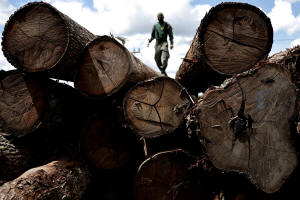|
The
Science Panel for the Congo Basin, backed by the United Nations
Sustainable Development Solutions Network, aims to issue a
report in 2025 that offers the most detailed scientific
assessment to date about the Congo Basin.
"We are talking about a unique ecosystem that supports hundreds
of millions of people, and also it plays a crucial role in the
regulation of the Earth's climate," said RaphaŽl Tshimanga,
co-chair of the panel and a water expert at University of
Kinshasa in the Democratic Republic of the Congo.
"Our current knowledge of the functioning of the Congo Basin
ecosystem is really very, very limited."
The Democratic Republic of the Congo, home to most of the
forest, had the second highest rate of tree cover loss in the
world last year after Brazil, according to Global Forest Watch.
That destruction releases greenhouse gas, helping to drive
global warming, and destroys vital plant and animal habitats.
The scientific effort is modeled on the Science Panel for the
Amazon that in 2021 issued a roughly 1,300 page report
summarizing the scientific consensus on the Amazon rainforest,
the world's largest.
That report showed that more than 10,000 species in the Amazon
risk extinction, explained its role in the global climate system
and quantified how much carbon the forest contains.
More than 300 scientists are expected to contribute to the Congo
report, Tshimanga said.
It will include sections on how the Congo regulates the regional
climate, human impacts on the forest ecosystem and how
scientific data can be used to inform government policy, he
said.
For daily comprehensive coverage on COP28 in your inbox, sign up
here for the Reuters Sustainable Switch newsletter.
(Reporting by Jake Spring; editing by Barbara Lewis)
[© 2023 Thomson Reuters. All rights
reserved.] Copyright 2022 Reuters. All rights reserved. This material may not be published,
broadcast, rewritten or redistributed.
Thompson Reuters is solely responsible for this content.

|
|




